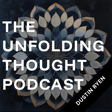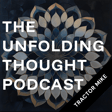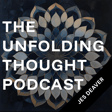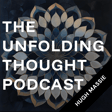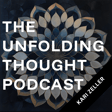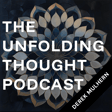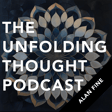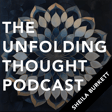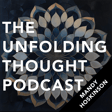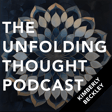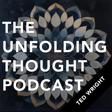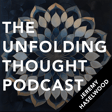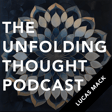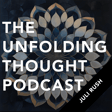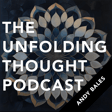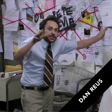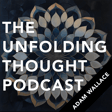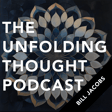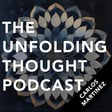Introduction to the Podcast
00:00:04
Speaker
Hi, I'm Eric Pratum. Welcome to the Unfolding Thought Podcast, the show for leaders and deep thinkers who demand more than the usual fluff. If you're the kind of person who moves on the moment things stop challenging you, I hope you'll feel right at home here. In each episode, we uncover the deeper, often overlooked forces that shape our thoughts and behaviors so you can see yourself, your team, and the world.
00:00:34
Speaker
from a whole new angle and then actually apply what you learn to grow and do better. We aim for minimal filler and maximal insight, challenging assumptions and sparking new thinking every step of the way. Are you ready to dive deeper? Then let's get started.
Meet Elliot Frick
00:00:54
Speaker
Today, I'm speaking with Elliot Frick, founder of Big Wide Sky. Elliot has been an entrepreneur for over 21 years, and as you will hear, he is also in the 97th percentile of the behavioral trait called openness, which is an interest in abstract thinking and ideas.
00:01:14
Speaker
In our conversation, we explore the limits of reductionist thinking, why grand visions matter even in seemingly ordinary businesses, and how a renewed focus on meaning and the unknown can help leaders build more resilient, innovative organizations.
Listener Feedback
00:01:36
Speaker
Before we get to Elliott, I want to say thank you to everyone that has given me their feedback on this podcast. Specifically, specifically I want to call out my friend Hal Shield, who runs a business that does podcasting and media for their clients. And also my friend Aisha D'Cruz, who's a former colleague, an entrepreneur, and a consultant.
00:02:00
Speaker
While many people have given me their feedback, Hal and Aisha have so far motivated the biggest positive changes in this product. So thank you for that. If you yourself have input or simply want to connect, please email me at eric at inboundandagile.com or look me up on LinkedIn. And now I bring you Elliot Frick.
00:02:27
Speaker
Elliot, thank you for
Elliot's Role and Interests
00:02:28
Speaker
joining me. Would you mind giving me a little bit about your background and who you are? Well, Eric, thank you for having me on your podcast. And, um, I am Eric's colleague at Big White Sky. I am a bit of a AirSats polymath interested in a lot of things. I've always been, you know, mindful of the aphorism that a jack of all trades is a master of none. So maybe that's me. I can't, I can't, uh, avert to be having become a master of any of the domains that I care about, but I do care about a lot of different things.
00:03:04
Speaker
I love political science, philosophy, neuroscience, philosophy of mind, the innovation theory, ancient Greece, all kinds of things. so yeah And I guess that's what a polymath is, is somebody who really knows a great deal about all those things, which I'm not proclaiming to. i That's why I say I'm an air stats polymath. I'm a ah poser to polymath status.
Eric's Career Journey
00:03:29
Speaker
I suppose by way so that we can get to a bit of how you see people, how you see groups, and why that's important. You know you referenced our colleagues, so I'll give a little bit of my background.
00:03:45
Speaker
as it relates to you, Elliot, and ah maybe that will give everyone a window into what you do and what Big White Sky does and and see where we go from there. So I had spent somewhere around 15 years or so, 17 years, something like that in marketing, doing for a time.
00:04:09
Speaker
some innovative work in digital marketing, some relatively groundbreaking social media stuff, some early digital analytics. Eventually I tired of that for reasons that I just won't get into at the moment, but I moved on to working in digital and integrated fundraising and I was looking for something new and I found a big, wide sky and I felt like I had this experience or this realization that, you know, when you sell websites and someone comes to you and they say, I need a website. You have some discussion or do some discovery with them. And do you realize, well, I can sell you a website, but it's not going to solve your problem.
00:05:01
Speaker
Your problem is you have a leadership issue or you have a morale challenge or there's something in the marketplace that you are confronting and you maybe don't even realize it, but you've asked me for a website and I can give you the website, but your problem's not going away. When I encountered Big White Sky, I felt like a lot of the challenges that my former clients had faced that we didn't have solutions for were here. That's not to say that all of them are a big wide sky, of course, but I think what I recognized was that
00:05:48
Speaker
There are challenges around how people set vision, not just goals, for example, but where are we all going to and why is that important? There are challenges around how do we even conceive of the problems we face? How do we conceive of the the audience? We can give innumerable examples, but It was like a breath of fresh air, and I was really drawn to that. And at the time of this recording, I've been with Big Wide Sky for just over six
Critique of Reductionist Thinking
00:06:23
Speaker
years. And Elliot, I think you are coming up on 21 years of having run this business, is that right? Yeah, that's correct, yeah.
00:06:34
Speaker
Well, and it's interesting that, I mean, first of all, and I'm grateful to work with you and that you think that what we do is valuable. The thing that comes to my mind about what you're talking about is another aphorism about, you know, when all you've got is a hammer, everything looks like a nail. If you apply that concept to something like maybe epistemology, right? Like how do we know things?
00:07:00
Speaker
I think it's fair to suggest ah that once you decide that you know things in a certain way, you come to see everything that you know in that way. This also then connects to and another concept, which is the sort of Nietzschean herd, right? This idea that people are predisposed to think the way, act to the way that those around them think and act.
00:07:25
Speaker
So you put these two ideas together, right? if you If you have a certain understanding of how to know things that you start knowing everything in that way and that we're predisposed to think and act in ways that others think and act, you know, because it's there's a protective mechanism there. It makes you feel comfortable that you're you're not in danger because of it. I think it's fair to suggest that, you know, for I would say at least 100 years and it's probably a decent amount longer than that.
00:07:55
Speaker
But you can say it with some confidence that you're you're speaking the truth about the world to say that the last hundred years at least the sort of collective human way of knowing has been coherent pretty consistent and it is also very very mechanical that we sort of understand everything.
00:08:16
Speaker
in a basically ah mechanical way. I can use maybe some marginal words to describe it that are, ah you know, marginal in that most people maybe don't hear them most of the time, but are actually in some ways more accurate, you know, that that our understanding of of what we know and how things work and what we should do is very reductionistic, for example.
00:08:42
Speaker
So, and by that I mean that we we can reduce everything that happens in our lives down to underlying mechanisms. So again, it's a mechanical thing. They're underlying mechanisms. And maybe those mechanisms might at first look like, I don't know, maybe psychology, for example, but you get underneath the psychology and then there's neuroscience and you get underneath the neuroscience and it's like neurochemistry, biology and so forth. And under that is Well, physics and then finally math. So sort of everything that happens in the world, everything we do, everything we know about the world is really just reducible to math. So that's one of the things that I think that we've come over the last hundred years to believe.
00:09:27
Speaker
But also something like, well, I get there are lots of sort of philosophical frames for understanding this, but one is is sort of skepticism that the you know the evidence of our senses are not to be
Skepticism in Leadership
00:09:41
Speaker
trusted. So we should defer to formal definitions of things. And so one of the ways that we know things about the world, and we're we presume that we should act on what we know,
00:09:53
Speaker
ah is that everything is deserving of skepticism. you I can continue on this path, empiricism, valorizing or or or sacralizing the individual that the individual is the most important thing. A bunch of these things come together, but basically what it's done is, I think, to blind us generally, but in particular, leaders to what is entailed in solving really difficult problems.
00:10:20
Speaker
that we you know by only having a reductionist, mechanical, formal, skeptical, egalitarian frame for understanding everything, that much of what animates the nature of the problems that we confront is just absolutely invisible to us. Because if those if that frame that I just described is incapable of reducing something important about the problem that you know doesn't fit into that set of philosophical understandings, it just treats it as nonsense. And so I think a lot of, like I say, a lot of leaders are really confused and don't even often realize
00:11:03
Speaker
How confused they are because they want everything to be a reductionistic thing they want everything to be a mechanical thing they want to know what button to press or what dial to turn or what. And and where to turn that dial and some things are not reducible some things are not ah mechanical.
00:11:23
Speaker
Or at least if if they are, we don't know how the mechanism works. And to treat them like we do is folly. So that's why I think you know you were saying, well, Big White Sky seems to address these things. I think it's and in part because we have that posture. you know We assume that ah while all of these tools for understanding are that we have collectively accepted over time.
00:11:50
Speaker
are useful that they don't tell the whole story and and they don't in some ways deal with some of the most important components of the problems that we face.
00:12:01
Speaker
Am I thinking about this incorrectly or in a bad way when I think the way that you're describing this, this challenge, could we put it as, okay, so you're a business leader, you're facing a challenge. And I think, I think I hear you saying that.
00:12:23
Speaker
There are some things that are not reducible to the frameworks, the mental models, the they just don't fit within your measurement system. And so could I say that a way of describing the services the big white sky might sell you the way that um we would approach our work, we want to widen your field of view. We want to widen your area of measurement. And it's not that some things are immeasurable. Some things that you're not currently able to measure or understand are measurable, that you're you are capable of understanding them. But your view at the moment is too limited. Is that a bad way to put what I think I hear you saying?
The Role of Intangibles in Leadership
00:13:12
Speaker
No, I don't think it's a bad way to put it. It's not value-laden per se, although I guess it is, maybe to some degree. But I don't mean to say, oh, you're bad or immoral or something for thinking the way you think as a leader or But yeah i do think that it is a challenge with the scope of the sort of philosophical frame that you come to a problem with that that's where the challenges and so there there was this guy. ah
00:13:44
Speaker
Immanuel Swedenborg, I think, was his name. I don't know a ton about this guy. Other than that, I had a mentor who really loved him and was on about him all the time, was a member of the Swedenborgen, Swedenborgian, I'm not sure what it's called, a foundation or society or whatever. But I do recall one little anecdote that he shared with me about how Swedenborg said, if you want to understand the value of things that are not formalizable, that are not measurable,
00:14:13
Speaker
Ask yourself this question. If you could place, you know, some quantifiable and large amount of wealth on your bedside table before you go to bed at night, you know, so I don't know what, $10,000, a million dollars, whatever it is. And you wake up in the morning and it's gone.
00:14:30
Speaker
you know, how would you feel about that? But then think about it in this way. If you could place the love that you have for your child or your spouse or your parent or whatever it is on the bedside table and it were gone in the morning, how would you feel about that? And then compare those things and I mean, it is is not the loss of the love that you feel for someone that you love at least as compelling or important or valuable as the loss of that quantifiable thing? And yet, how would you quantify your love for your child or whatever it is? And how would you even formalize such a thing?
00:15:10
Speaker
And I don't mean to try to describe this whole problem just in terms of some sort of philosophically romantic idea. It's like just about love or something or whatever. But what I think is germane about that little thought experiment is this notion that there clearly are things that are deeply important to us and that animate our understanding of the world and our behavior that we can't think of properly as purely mechanical, for which there are no buttons to press, there are no levers to pull, there are no knobs to turn, right? And even if there are, you know even if we can imagine that there might be quantifiable responses to these things that are that don't seem quantifiable in and of themselves,
00:15:59
Speaker
like it's not clear what choices you should make about those quantifiable responses and that that's maybe the heart of the problem that people face now you know and so yes i think you're right in saying that our frame is not big enough. To understand the problems that we're dealing with.
00:16:18
Speaker
But more explicitly, the thing that our frame tends to leave out is stuff that we can't put into an Excel document. and that those are the things that in the And I'll go even one one better and say that I think that not only do especially leaders, but most people who live in the developed world or whatever, not only do leaders and those folks sort of make the assumption that everything is basically mechanical, but that moreover, they have come we have all collectively come to believe that it is folly to think about it any other way, that it is wisdom to completely reduce everything, to mechanize, formalize, algorithmatize everything.
00:17:05
Speaker
and that you're not there's nothing wise or intellectually compelling about moving outside of that frame. In
Marketing and Meaning
00:17:13
Speaker
fact, it's more likely that you're engaging in some sort of subterfuge woo-woo flatter theory kind of nonsense.
00:17:21
Speaker
so so not only are we sort of collectively encouraged to think in this very mechanical way. But we're also encouraged to assume that any alternative is something that we should feel bad about. And that if you engage in that kind of thinking, you will be branded as an unserious person. To use the bedside table example again.
00:17:42
Speaker
Could we say then that maybe a challenge that a business leader would face that I guess they might not know how to contend with or they might not know how to report the issue up to their board might be something like you could put the meaning behind your organization's work or a sense of hat a sense of purpose or even an individual product, right? I mean, not just the whole firm, but I mean, any of your offerings, like do they have meaning or are they just mechanically filling a niche or whatever? Right. So you have a product. I have no idea. Let's just say that you make water bottles and the sense that these water bottles have some value to people.
00:18:37
Speaker
not Not financial value, but a feeling of value. Is that what you're saying? A business leader in a company that makes water bottles might not know how to contend with the fact that their potential customers, no matter whether they put a price on the water bottles or not, they don't feel like that's something they need anymore. And how do I deal with that?
00:19:03
Speaker
Yeah, I mean, well, first of all, I think the people who are involved in marketing and advertising generally speaking are ah maybe constitutionally predisposed to romantic philosophical thought, you know, philosophical romanticism.
00:19:18
Speaker
Which is fine. There's nothing wrong with that. That's great. that that you know And that those people are drawn to that industry and whatever. However, this problem that I'm addressing here, this idea that ah we we are inclined to understand the world in a basically mechanical way, and that that really has has a profound impact on the way that leadership is discharged. you know Like how how we think about authority itself and what you can do and what you can't do and all that sort of thing.
00:19:46
Speaker
I think that marketing and advertising is sort of adopted it a somewhat contrary and posture and that it's thrown the baby out with the bath water and said okay like if my water bottle bills some needs to serve some utilitarian purpose. You know i i can generate some sort of algorithm for value all you know i don't know john stewart miller something and say,
00:20:09
Speaker
Oh well the utility function here says that the water bottle you know the plastic water bottle in particular does whatever it does you know. is just lifeless and soulless and awful. And so what I believe marketing and advertising has done is to abandon any of the the sort of pragmatic concerns that are involved and to advocate in favor of speaking to the soul of the audience or you know the customer or whatever. And in so doing, sort of be willing without even realizing it often
00:20:44
Speaker
to be abject liars and to make promises about how this serves the soul or the deeper human need or creates meaning or something where there really isn't any meaning. And the reason it's a lie is because the actual behavior of the organization is incapable because of its mechanical nature of fulfilling on that promise. And I believe the origin of that is this problem that I just described, which is the desire to provide a soul for this thing that's being sold, even if whatever it is that you you know whatever soul that you're you're identifying or or in some cases completely inventing whole cloth is actually something that the firm for which you're doing the work is capable of of living up to.
00:21:33
Speaker
And I think the advertising folks and marketing folks, they know this. They know on some like on the subconscious level that the firm is not going to be able to pull this off. I don't necessarily blame the marketers, although there are certainly some who are that they know that this is the problem and they don't care because they're going to make a buck. But for a lot of the just sort of rank and file people working at these firms,
00:21:56
Speaker
They just deal with this disconnect between trying to insole the brands and their and the products and feeling as though the client never really appreciates or understands it or they're always working at cross purposes. And for the most part, nobody says, well, why is this true? What's the problem
Perception vs Substance
00:22:14
Speaker
here? And I think it's the philosophical, epistemic problem around how we understand the world, what it is we think we're doing, how we describe what we're doing, how we know things about what matters and I'm reaching a bit with what I'm about to say in the sense that I feel like you've just opened a door and I'm seeing something that I've never seen before and I'm not quite sure how to describe it. You go back to
00:22:45
Speaker
drawings from hundreds of years ago of go the first time that some explorers saw a whale and they draw it and it looks like a dragon. So forgive me if I do a poor job trying to tie this together, but am I thinking correctly that business as a practice or as a space or whatever has optimized for efficiency for reducing many things down to best practices to kpis and so on and then i think i hear you saying that. The marketers and advertisers are often in the position of saying well to effectively communicate with this we have to get back in touch with some of those things that were lost and then if if i am hearing that correctly one thing that.
00:23:36
Speaker
It sounds like you're saying is that meaning those things that were lost sometimes perhaps often needs to come or can best come from inside the organization and not from someone coming from the outside and saying oh Here's the story we can tell or here's the meaning that we can graft on to it So that we can convince people to buy Yeah, I think it's both sort of synthetic and integral. So what I mean by that is that I don't think there's anything wrong with seeking outside. Well, so he's a somewhat nefarious character, but there's this guy named Aleister Crowley who
00:24:18
Speaker
I won't dive into anything about him, but I'll just say that he wrote an essay, and I don't quote me on this, but I believe the name of the essay was The Yoga of the Cheese. And he says in it, oh, well, is the cheese cheese because of what's inside the cheese? What what makes the cheese cheese? Is it something constitutive of the the actual physical object?
00:24:44
Speaker
And he's like, well, no, it's not quite that because different people have different ideas about what constitutes cheese. And if you go around the world, there are cheeses that are made in different places, you know, that they're geographic isolation from one another and cultural isolation from one another.
00:25:04
Speaker
resulted in different processes for generating something that's still called cheese. And so so it's not merely in the in the cheese itself, but it's also not merely in the observer. I mean, because but that's the alternative, right? Is that, oh, well, whatever I say the cheese is, is the cheese, you know? And this is Cartesian dualism, right? I mean, it's like the mind versus the body kind of, you know, split.
00:25:28
Speaker
Now, what Curly came to in the in the end of the essay is that what actually makes the cheese is the relationship between the observer and the cheese. It's the dance, the yoga that's being done between the cheese and the observer that that makes it what it is. And I suppose that that seems somewhat naval, gazey, BS kind of mystical.
00:25:52
Speaker
But I think there's something to that and even if the even the most hardened like that of the data driven a marketer can't be lied the fact that. There are products that end up being incredibly popular and successful that nobody expected to to do so that there are strategies for marketing products brands whatever that.
00:26:14
Speaker
nobody expected to work that did and to what do we account this phenomenon and it's funny many many years ago for a brief period of time i had a small group of friends who were very committed to iran and yeah i appreciated them and that whatever, the whole Rand thing. But one of the things that really annoyed me, and then I kept trying to, it it's finally actually what led me to like not spend any time with them in anymore, was I said, like basically your your whole method for contending with the ambiguous or the unknown is to say, even if objective, measurable, mechanical solutions haven't figured out this problem, they will eventually.
00:27:00
Speaker
And I'm like, how do you know? I mean, that's, but why is that not faith? And I guess my point is, is that the easiest way to, it seems to me the easiest like sort of apologia for, you know, mechanical ways of doing things like marketing, for example, is to say, well, you know, we didn't understand why that product did well.
00:27:26
Speaker
And we don't understand why that strategy did well. But we will eventually figure it out. We will eventually figure out what it was that was measurable about that. And we'll start measuring it, and then we'll optimize that. And maybe that's true. Maybe it's true for everything.
Limitations of Reductionism
00:27:42
Speaker
But we don't really have a basis for being certain about that. And even more deeply, I would say the process by which you come to understand or you identify what in the unknown thing that worked well. you know the thing The thing that worked well that nobody expected to work well. What it is that makes that valuable. The process by which the cognitive process by which you come to understand that is in and of itself not quantifiable.
00:28:12
Speaker
So even if you're able to quantify what works in the thing that you didn't understand why it worked, be heretofore, doesn't mean that the process by which you figured that out is quantifiable. So I said synthetic versus, well not versus, but things are both synthetic and and integral. Synthetic I think is like,
00:28:35
Speaker
a little bit more quotidian. It's a more every day. It's like I know some things that have been proven to work elsewhere and I can bring them here and add them to this thing and you should you should trust me on this because I've seen it work elsewhere and that's great. But integral, I think, involves something deeper. like I recognize that the process by which I came to understand this is not something I fully understand.
00:29:00
Speaker
You know what I mean? To get a little stupidly philosophical here, they so there's, you know, Wittgenstein, you know, he wrote the, what is it, Tractato Logico Philosophicus or whatever, is this book that is he's most associated with in it to vastly oversimplify it. What he basically said is that the only things that you can say that are worthy of being called either true or false are things that are either empirically testable or our statements about existing formal arrangements. In the latter case, he called those tautologies, right? That like if I say, well, two plus two is four because the rules for the system are that arithmetic works in this way, whatever.
00:29:44
Speaker
then I'm not i not adding anything new by saying that. I'm just reaffirming in different language something that was already formalized. So those statements can be true or false, right? They're tautological. you know They just restate the truth or they state it as a falsehood in which case they're false. The only other true or false statements are empirically demonstrable statements. So like I say this,
00:30:11
Speaker
And I can go and run an experiment and demonstrate that it actually is or isn't what I said, right? Now here's where it kind of puts in place a lot of the paradigm that I was just talking about. He says, any any other statements about the world that are not either empirical or tautological are not true or false. They're just meaningless. They're just nonsense.
00:30:39
Speaker
right So if I say, I love my wife, I'm not saying something true or false. I'm saying gibberish. And so the reason I invoked ah Wittgenstein and wanted to share that oversimplification of of his work is because the part of it that I think is really profoundly left out is How did he come to these insights? And maybe he could say, well, others kind of came to them before in nascent form, and I just formalized it a little better or something. Well, how did they come to those insights? Presumably there were, at minimum, thousands if not tens or hundreds of thousands of years that human beings didn't have an empirical, rational, you know, physicalist, materialist worldview, that they didn't think like Wittgenstein. But somehow we got from that to Wittgenstein.
00:31:31
Speaker
So there must be something going on that is not merely empirical or tautological that ah in in in human cognition that matters, that is important, that does something important. The
Jobs Theory and Customer Needs
00:31:46
Speaker
question you asked, and I circumlocuted it, is like, is there any utility to outside insights? And and yes, I think there is.
00:31:54
Speaker
in In particular, in the synthetic sense, like I need to make my IT t systems work better, and an IT firm that really knows what all the best practices are can really help me. But if the problem that I'm dealing with involves unknowns that are not known by anyone else, that are novel, or that have variables that are novel, it gets harder.
00:32:14
Speaker
Now, can an outside entity be useful in that context? Sure. But I think one of the the greatest ah justifications for the hubris of the big consulting firms is that they don't contend with this either. They come in and they just say, here's what you should do. They treat everything as a synthetic problem and nothing as an integral problem.
00:32:35
Speaker
Maybe to draw a comparison to a challenge that a lot of business leaders might be in, it feels to me like what you were describing is somewhat similar to a a common situation that's described with jobs theory or jobs to be done. And Tony Ulwick and the Stratagen people ah developed this and then it was popularized by Clayton Christensen. And in one of the books, if I recall correctly, there's a story. I was first introduced to this story by you, Elliot, and then subsequently read the books. But for everybody who's listening,
00:33:18
Speaker
Basically, there was a fast food chain that was thinking of removing milkshakes from their menu. ah Eventually they decided to do some of this ands anthropological research or this jobs research. And the idea behind it is that every product is a surface. If you sell water bottles, your product is not the water bottle, it's hydration.
00:33:41
Speaker
Or there's a famous quote from Theodore Levitt, of I think it was Harvard Business School in the early 1900s. Sixties, I think. He's a little younger than I thought he was. And it was, you know, nobody wants a quarter inch drill bit, everybody wants a quarter inch hole.
00:33:55
Speaker
And the idea of being nobody cares about the whole, they care what it does for them. So, um, when you're selling your drill bits, maybe connect with what it is that the people want, which is perhaps why you might see a commercial for drill bits that is not talking about how hard they are, how long they last as much as it's showing. you know, like tugging on the heartstrings type story about how because of this drill bit, I was able to hang a picture of my mother that I see every day and she passed and it reminds me of her. And it's a commercial for drill bits with the milkshakes. They were thinking of removing them. They did research. They found out that there are certain times at which people buy the most milkshakes. And they found that the most milkshakes are bought in the morning while people are on their way to work. And then also in the evening on the way home. And they came up with.
00:34:49
Speaker
these certain reasons why people were buying them, which I'm skimming over. But then there were advertisements. I think there were billboards or whatever it is. And it was things like, you know, this milkshake gets you to work in the morning.
00:35:02
Speaker
And they made the they made the ah straws thinner and made the shakes thicker in the morning so they would last longer so it would get you all the way to work. And then in the evening, some of the challenges that they encountered was that people were buying them for their kids and then the kids weren't drinking them fast enough in the restaurant and people didn't want them in their cars because the You know, if anyone else listening to this is a parent, you know that they make a disaster of the backseat. And, and so then they would message around that use case, if I can call that or those needs so that job to be done. And I bring all of that up because it sounds to me like.
00:35:42
Speaker
ah challenge i guess that you're posing eliot is that as a business leader i may very well be facing a situation where i can bring in a marketer or i can bring in a management consultant or a business coach or whatever it is and.
00:36:01
Speaker
if in this particular case, what they're going to give me is the best practices. Oh, well, you just need a message in this way. Or you just need to, I don't know, rearrange your business to follow EOS. It's entirely possible that because I'm facing something that we don't yet understand well, or we're mischaracterizing the challenge that I'm facing,
00:36:27
Speaker
that we will apply best practices that do not actually connect with the job that needs to get done in this instance. Did I draw a fair comparison there? Yeah, I mean, I think it's it's fair to talk about that in this context. And it it opens up ah an even yet still deeper philosophical can of worms, at least for me, because I'm messed up in that way. That's what happens. and Let me put it this way. I think that the purpose of the epistemic worldview that we have now that I was complaining about earlier,
00:37:01
Speaker
is that it presupposes that ontologically, meaning, what is the nature of reality? Ontology is the study of the nature of reality. Like, what is it? that Our epistemic paradigm presupposes that reality is basically fixed. There are things To know that we do know and there are things to know that we don't yet know but that Eventually presumably at some point we can know enough to basically know how everything works like a really good example of this is ah there was a guy named Pierre Laplace and he But offered up a thought experiment that's now known as Laplace's demon and so the idea was like imagine a demon
00:37:40
Speaker
You can think of it as like a supercomputer, right? Its unique ability is that it can take any data set, no matter how large, and compute that data sense and set against a an algorithm, a set of equations or whatever, instantly. So it doesn't matter how complex the algorithm is, and it doesn't matter how big the data set is, it can instantly give you outputs for that.
00:38:07
Speaker
Now, if you imagine that the dataset is the location and momenta of all the particles in the universe, and the algorithm is, let's say, Newton's equations.
00:38:19
Speaker
Because newton Newton's equations work forward or backward in time equally well, they're time independent. This set of circumstances would essentially render the demon omniscient, right? Because it would be able to tell you the location and moment of every particle in the universe at any point in the future or in the past.
Living Systems and Novel Outcomes
00:38:41
Speaker
if we're basically reductionistic about it, we can we can reverse engineer back up to supervening outcomes. you know So this baby was born, this planet collided with this planet. ah This star went supernova, you know whatever.
00:38:58
Speaker
at any point in the past or in the future. So the implication then is that the the nature of the universe is utterly fixed. I think that's extraordinarily arrogant to make that assumption. And if there's anything that sort of the nature of living systems suggests to us that is unique about liz living systems, it's the ability of living systems to sort of create and contend with novel things to create, for example, ecological niches that had never existed before. you know There's a guy named Stuart Kaufman, who's a bioinformaticist, used to be an MD. One of the things that he has talked about before is the lung of the lungfish and its relationship to the swim bladder.
00:39:48
Speaker
So, most bony fish have an organ that is basically a ballast, and it's what allows them to manipulate their neutrality in the their their buoyancy neutrality or lack thereof in the water column. Like, is the fish going to go upward or downward in the water column? And the way it does it is by adding or expelling water from the swim bladder. Well, the swim bladder was almost certainly an adaptation from the lung of the lungfish. ah you know You have this unique fish that rather than gills, it has lungs and how that works and whatever. And that organ became the adaptive environment for which the emergence of the idea of the swim bladder could happen.
00:40:34
Speaker
Now, what's interesting about that is the swim bladder, because of its nature, creates this extraordinary ecological niche in which a completely novel bacterium could evolve because the selective pressures inside of that swim bladder are unique. And so a bacteria that hadn't existed anywhere before could suddenly come into existence because of the environmental pressures that that are created by this novel thing. Now, if you get that, what's weird is that you could say that the the lung of the lungfish was a pre-adaptation for this new bacteria that happened as a result of the intervening step of the swim bladder. Stephen Jay Gould always hated the teleological implications of the word pre-adaptation, so he called it exaptation. But
00:41:25
Speaker
regardless of whether you think about it teleologically or not. The fact that living systems can produce like completely novel outcomes is strongly suggestive that the universe is, especially as manifest in living systems, is a dynamic place. It is not a static place. And that what will be and what has been are not predetermined, are not merely reducible to a set of algorithms that are just so big we haven't discovered them yet.
00:41:55
Speaker
So, okay, so let me bring this back then to the jobs to be done thing. The cool thing about the jobs to be done thing is that there's a sort of involuted nature to how businesses tend to think about innovation and marketing and all that. And
Impact of Epistemic Worldviews
00:42:10
Speaker
as much as we want to know about the audience, we'll do some surveys or something, but it's all very much arm's length and we know what to do. We're the ones who run this. We make the choices, whatever.
00:42:18
Speaker
And jobs to be done helps to convolute that a little more, to encourage us to look outside of ourselves, to find key insights about what we might do. the The problem with that, I think, is that it's still, given a reductionistic world, easy to assume that, well then, you know once you figure those things out, you've got it sort of solved, you know what I mean?
00:42:43
Speaker
Now, I'll introduce like sort of another wrinkle here, which is that I think there is something about the nature of humans, like of human nature, and the nature of all living systems, incidentally, that we share, but some things that are unique to to human nature.
00:43:00
Speaker
that are well established enough that they have become what you might call something like best practice in human nature. And yeah, you know I think jobs to be done help us helps us to identify those things. But what jobs to be done doesn't do.
00:43:19
Speaker
is identify the parts of human nature that are are not have not yet been established as best practice or how it is that humans come on to ah novel insights that influence the nature of best practice for human nature or something. And so the challenge with this epistemic posture of saying everything is knowable algorithmically, we just have to figure out the algorithm, is that even if you introduce something that feels more human like jobs to be done,
00:43:49
Speaker
The worldview will still figure out a way to make it reductionistic, to make it about best practice. And in the case of this particular fast food chain, if the the challenge that they were facing, they they found the solution, they found the ah way to understand it, the way to message through it. If some other fast food chain was to just look at those billboards and go, apparently we need to market that our milkshakes can get you to work in the morning.
00:44:21
Speaker
But they don't change the thickness, the viscosity of the milkshake, they don't change the size of the straw, whatever. And they're not actually contending with the reality of the situation, the reality of the job to be done in this particular case.
00:44:37
Speaker
And so if I hire a consultant and this consultant they they specialize in, I'm not meaning to pick on EOS. I know that EOS is a strong system and it has its place, but I'm just going to use that because it's ah that's a name that a lot of people live. I hire a consultant and they look at my challenge and say, it's simple. You need to implement EOS. Well, they may have all the best practices in the world.
00:45:05
Speaker
But the challenge that I face may not be one that is explainable within the view that they're taking. So that's where I was going and I just forgot to take it there with jobs to be done is that was meaning to ask really about a business leader faces a challenge and they're going to be for some challenges there will be established best practices just like there is with EOS.
00:45:31
Speaker
But there will be other times in which it takes someone doing the equivalent of, in the comparison that I'm drawing here, the equivalent of some jobs to be done research to say, in your particular case, here is the challenge you face. Here is a description of the challenge. Here is a way of thinking about the challenge.
00:45:52
Speaker
And you previously did not have the frame in which to see it. You didn't have the words that could be used because it didn't fit in your existing worldview. Well, yeah, no, I would say two things about that. First of all, what is known is contended with most effectively by formal processes. What is unknown is not best contended with by formal processes. So that like that's the simplest formulation that I can offer to to to contend with this, but it goes a little deeper. i mean like So I think about Ian McGillchrist and his work on hemisphericity in the brain and whatever. and you know This idea that the brain has a left and right side and that this is demonstrative of something important is an idea that fell out of favor once we started doing MRIs and the things that we associated with the left and the right brain didn't
00:46:47
Speaker
show up in those MRIs as ah in the way we thought they would, and so we just threw the whole thing out. But he kept at it, and and a lot of the research that's been done, near near neuroscience research that's been done around this in the last however 15 years or whatever it seems
McGilchrist's Hemisphere Theory
00:47:05
Speaker
to really back up his point of view, which is that, and and he really laid it out in his first book very well. That book was called The Master in the Emissary.
00:47:14
Speaker
And what he said is that the right brain is actually the master and the left brain is the emissary. And so the left brain is, you know, associated traditionally with just like rationality and whatever, and the right brain with creativity or something. And that's the stuff that has been modularized by and MRIs or whatever. but But he reframed it. He said, and well,
00:47:35
Speaker
Before i I say how he reframed it, I will mention that even though it lost favor, and you know the the whole idea of hemisphericity, it was not before most people came to, at a colloquial level, accept the idea that left-brained means really rational, like you're like Spock, and right-brain means you're really creative, like Da Vinci or something. But his reframing is to say, no, what the left brain does, well, what the right brain does is respond to the unknown.
00:48:04
Speaker
And what the left brain does is catalog the workable outcomes. so So the left brain is like an Excel document. He gives the example of like a bird on the ground, a small bird, a sparrow or something on the ground. Well, that's not the ideal place for a sparrow to be. It's not where its advantages are most obviously felt or whatever, but it's there because why? It's it's looking for food.
00:48:26
Speaker
And so it's looking on the ground and it's like is that a pebble that i can't eat or is that the top of a worm that i can grab and eat or whatever and making those sorts of evaluations is a left brain activity that sound that came from the forest off to the right of the bird that it hadn't heard before or maybe it had heard but it wasn't sure what it was.
00:48:47
Speaker
It was an anomalous bit of sensory input data and turning the bird's head toward it and wondering what's there and creating an imaginal space around that sound. It could be a predator. It could just be another bird. It could be whatever.
00:49:03
Speaker
That's the job of the right brain. It's interesting too, because there was a conversation I think it was McGillcrest was having with Jordan Peterson or somebody. And I think Peterson said, yeah, you know, a really great demonstration of the power of the right brain is, let's say you're in a house, maybe you're house sitting for a friend, and it's a big old Victorian house, 120 years old, something.
00:49:25
Speaker
And you're there alone and it's late at night and you're reading a book in the living room. And there's a room off to the side and you hear a sound in that room that is a little bit like spooky for whatever reason. You don't know what that sound is. Go to the door of that room, reach your hand inside without fully opening the door. Just crack it open a little bit. Reach your hand inside to the to the light switch. But don't turn on the light switch and watch what your brain does.
00:49:52
Speaker
And what it does is all right brain right it's like ah some spider is gonna crawl down the wall and jump on my hand somebody's in the sun you know like sociopath is in there with an axe and he's gonna chop my hand off for. You know any other million things that you're right brain might come up with.
00:50:10
Speaker
This like sort of predisposition of the right brain to contend with the unknown is the kind of cognition that I think that I'm trying to say our current paradigm has ah undervalued.
00:50:25
Speaker
And it's not just undervalued it it is given it a status of pariah right like to think like that is to be. I'm serious to be there like i don't know for example there is a there is a article in the atlantic from about a year ago or something that was hillary in alan musk because at space x.
00:50:45
Speaker
They try all these things that don't work. And it's just like they're throwing stuff at the wall to see what will stick. And they characterize this as the sort of proclivity of the kind of style that is representative of the proclivity of a ah a leader that is unserious. There's not a real plan here. There's not you know clear clarity about what the outcomes are going to be if I do this, that, or the other thing. And they haven't worked it all out. They're not willing to do the hard work in advance. you know And I mean, my response is the only way to contend with the unknown is by treating it as such that the predisposition to come to the table where you're contending with something ambiguous or unknown with a a big set of preordained solutions is the height of arrogance. It is
Balancing Solutions and Unknowns
00:51:33
Speaker
absolute hubris. You know, I mean, i I could hold forth for a long time about what I think the psychology is behind that, like why it is that
00:51:41
Speaker
especially leaders have ah become so enamored of this way of thinking about things. But yeah, there there's no amount of, well, and maybe I should just say this. I'm not saying that best practices, formalization, the scientific method, any of that stuff is bad. You know, skepticism.
00:51:59
Speaker
empiricism. that There's nothing wrong with these things. They're great. They're wonderful. They've given us extraordinary stuff. I think indoor plumbing is he's like an unmitigated moral good. you know what i mean so I have no problem with those kinds of systems. I just think it becomes a problem when we assume that the mechanization, formalization of things that we've been able to accomplish is what is involved in exploring the unknown such that we're allowed to create new formalizations. That's the part that the sort of everything is formality, everything is is is an algorithm. That's what that leaves out of the equation is.
00:52:41
Speaker
What is entailed in that? And there seems to be something, and maybe I'm burying the lead here, but there seems to be something uniquely human about the ability to contend usefully with the unknown, or at least uniquely or unique to living systems. Okay, so there's a business leader who they're contending with big and small challenges, and yet they've encountered a challenge that seems particularly difficult to solve or every time they knock down one one pin, another one springs up and it's like either it's just unending problems so or the things that I'm fixing aren't actually ah addressing the primary challenge that I have. And so would you say that if your desire as a business leader, so speaking to an audience here,
00:53:33
Speaker
If your desire as a business leader is to not break any new ground, it's to just follow a well trod path. you know You want to run an accounting firm. It's like every other accounting firm and you just want to have a good business and be done with it.
00:53:49
Speaker
then It's entirely possible that you don't have to go out and explore the unknown, but that it may be a uniquely human thing to explore the unknown. It may be part of your nature, but also if you want to do anything new, if you want to do anything groundbreaking or particularly meaningful.
00:54:10
Speaker
then you're going to have to be willing to take a wider view or you know have someone help you see things in a way that gets beyond the currently but likely reductionist view that you take of your business.
00:54:28
Speaker
yeah Well, I mean, I would say, first of all, that I think that ambiguity or the unknown or whatever ah manifests both on relatively short time scales and on long time scales. And and and they they are not constitutionally different per se, but there are different postures that a leader might take in terms of which of the two they're dealing with.
00:54:55
Speaker
so like on a short time scale for example yeah i mean within a given firm. There are all kinds of problems to be solved that are best solved by existing solutions by best practice solutions you know i mean best practice we use as a sort of like catch all for a lot of things but i mean like sometimes they're not best practices they're just.
00:55:14
Speaker
pretty good practices and that's good enough. But the point is, is that a lot of the problems in the near term that leaders have to solve are solvable through pragmatic solutions. I mean, like, oh, well, my competitor is using some toolset really well, but an ERP of some sort or whatever it is, and they're using it really, really well. And we don't even have one.
00:55:38
Speaker
you know like The goal there is not to like pioneer some new way of dealing with it necessarily. for in but in In the vast majority of cases, it's like, just do what your competitor's doing. you know Maybe try to do it a little bit better, you know implement it a little bit better or whatever. However,
00:55:56
Speaker
Even in a firm that's like yeah you mentioned an accounting firm and the notion that behind that invocation I assume is that we can presume that that accounting is basically an innovation-free domain of knowledge.
00:56:11
Speaker
And so, oh, well, we just want to get good at doing this thing that is already, you know, they're already really well-established frames for action. But even within that, like how are you going to differentiate from your competitors? Like there's at least some amount of ambiguity involved in that. And well, you can say, well, marketing, blah, blah, blah, you know, whatever. But it's funny too, because when marketers deal with questions like brand strategy in particular, stuff like positioning,
00:56:39
Speaker
It's where stuff gets the most woo woo and the the the proliferation of examples of things that were positioned with a lot of money behind it, and it failed for whatever reason. by ah you know The VHS, Betamax thing, I'm just aging myself here, I'm dating myself, but you know that like oh everything was going for Betamax in terms of positioning. like it They had all this stuff, and it didn't it didn't work. Well, because there was some ambiguity there that was not fully explored. So even if you're on a short time scale,
00:57:16
Speaker
even if the majority of what you do as an organization is really well known. And so adopting the practices of others is useful, doesn't mean that that's that you'd have no ambiguities on the short time scale to deal with, there are still those. And your ability to deal with them is going to in part be determined by your skill, whether or not you have a ah this sort of philosophical posture that permits you to deal with those things without calling it navel gazing or stupid or a waste of time or touchy feely or whatever other pejorative business leaders like to use. But then if you look at the long time
Vision and Foresight in Leadership
00:57:52
Speaker
scale thing, long time scale ambiguity, I think revolves around the fact that even really, really, really big successful firms tend to just disappear. I mean, Sears was one of the biggest
00:58:08
Speaker
companies in the US at one point. And they're basically gone now. I mean, Clay Christensen talks about some study that was done. It was longitudinal. It was like a 50-year period of Fortune 500 firms. And they found that only like 6% of those firms stayed in the Fortune 500 more than X amount of the time during that 50-year period. And then many of them had it ceased to be going concerns.
00:58:32
Speaker
So long timescale, the challenge has to do with problems that I think leaders don't have a philosophical frame for even understanding. Like why would legacy matter at all? And why couldn't, shouldn't you just make your money and get out? So to me,
00:58:49
Speaker
Both of these things, the long time scale thing and the short time scale thing, when it comes to ambiguity, this is why I am so focused on vision and foresight. It's always fundamentally about the future. I mean, hell, even dealing with things that are known have to do with your vision of what you want to be in the future. ah yeah Even if everything else is well formalized in the known stuff,
00:59:14
Speaker
the like, can I pull it off? Will it work? Will it create the outcomes I want? Will I have the future I want? That's still ambiguous. And so vision and foresight are fundamentally focused on the question of the ambiguous, right? And I think the long-term question, if it serves the ego, it's about legacy. And maybe it also only serves the ego to say it this way, but what about progeny?
00:59:38
Speaker
What about your children? What about your grandchildren? And I don't mean this in some sort of like bumper sticker kind of way, like, what kind of world do you want to leave here? Like, no, I mean more like, are you creating more possibility or less by merit of what you're doing?
00:59:56
Speaker
If I can take it maybe even further away from the potential of being viewed as woo woo, yeah, let's use an accounting firm as an example. A lot of times when most people hear things like mission, vision, values, there can be all sorts of challenges with what they think when they hear that. But I don't think when you think about vision, you always have to be talking about some grand vision that this ah accounting firm is going to accomplish. You know, you can talk about, you can have an accounting firm, I suspect that they just want to do a good job. And what do they make? How do they define a good job? Well, we get our clients paperwork done, you know, accounting needs done taxes, whatever it is, at a fair rate on time. Are you doing exceptional work? Perhaps not. But you're delivering what you promised. Is that a grand vision?
01:00:54
Speaker
I don't think a lot of people would to define it as grand, but part of your vision or an implication of this might be that ah what you want to provide to your employees is a place where they can come and they can just get their work done.
01:01:11
Speaker
and they can go home and that's what satisfies them. They don't want to take the work home. They don't want to have to you know go up above and beyond or I don't know what. That can be a you know grossly over oversimplified vision in this case.
01:01:29
Speaker
and To be able to recognize that and not just recognize it, but define it can be very important to knowing who you want to hire, knowing how you want to talk to those hires, how you want to talk to clients and all that. You don't have to face some challenge that is world changing necessarily in order for that vision to be meaningful.
01:01:57
Speaker
Yeah, well, I mean,
Cultural Impact of Mechanization
01:01:58
Speaker
this is why I'm more interested in doing combat with the ah epistemic worldview than I am with any business per se. And maybe this sounds elitist or something, but I think that for the most part, even most business leaders, especially small business leaders, are never going to have a grand vision. They're not constructed constitutionally to be the kind of person to have a grand vision. And that's fine. There's nothing wrong with that.
01:02:27
Speaker
The problem that I see is that the idea of grand vision is proscribed by our reigning philosophical worldview. That if the cosmos is just an already fixed thing and we're just trying to solve it, then vision, and certainly grand vision, is is extraneous. It's it's unnecessary. it's it's In fact, it's it's what's called hubris, right? you know Because like, who the hell do you think you are trying to say this? I mean, you know if you really want to do something good, study physics and learn how the cosmos works you know or whatever. and And even though we hold up examples of people like Einstein and say, oh, aren't they genius and great and amazing? It's not because of some vision per se.
01:03:13
Speaker
It's because, oh, well he helped us get closer to you know finally closing the lid on Pandora's box, you know that like, we've got it all solved now. And I think that the degree to which that infects everybody's understanding of the world is profound. It is massive. and And almost nobody is aware of the degree to which they've been influenced by that way of thinking. So so one of the reasons why I would like to see us have narratives that challenge the notion that everything is reduction material or whatever is not because I want to replace it with some sort of mystical stuff or something or some sort of theological stuff or something like that.
01:04:01
Speaker
But it's rather because I would like to make room for the possibility of grand vision. And so I think I've maybe shared the story with you before, Eric, but Tacitus writes about how he is like first century AD and he was saying, I'm worried about the future of the culture of Rome because.
01:04:21
Speaker
I think what is undermining it presently is the influence of Greek drama, which maybe is counterintuitive on its face or whatever, but he he expands on it and basically says that, you know, actors are valorized now. And and ah young people especially love actors. Sound familiar? And what's wrong with that? Well, what's wrong with that is that actors never have a transcendent meaning or purpose. They're always just doing whatever it is that's needed for the role that they're playing.
01:04:51
Speaker
They're this one minute, they're this the next minute or whatever. And he went, I mean, in modern terms, you might say it encourages FOMO. He finished this little description by saying that in cultures that are on the ascendancy, people are as of stones in a temple. They know exactly what they should be doing.
01:05:11
Speaker
So if we go back and we talk about, well, hey, the little guy, gal, whatever, runs this little shop, this accounting firm, whatever it is, not having any grand vision. If grand vision is not only an acceptable but a valorized part of the culture, it contextualizes the work of the accounting firm. It makes the accounting firm much more meaningful in a larger cultural sense.
01:05:37
Speaker
And I think the first thing I thought of when you said that was like, well, there's a paradox here, right? Because, well, I just want to make this this accounting firm where people can get the you know their job done and go home at the end of the day and whatever. And I have to bring their work home with them. But I mean, it's it's extraordinary, the number of employees, just in general, and you can see it all over social media, who find that absolutely soul sucking and awful.
01:06:03
Speaker
Oh, I can go home and be with my kids. Sure. But like, why am I even doing this for eight hours a day in the first place at all? And, you know, it has no meaning. It's building to nothing. The clients don't appreciate it. My boss, he pays me or whatever, but he doesn't really, you know, whatever. And, and I think the nature of that paradox is not so much that we need to fix the nature of the firm, although that's part of it.
01:06:26
Speaker
I think the much bigger challenge is that as long as we collectively, culturally sort of to try to expunge from our way of understanding the world, all of this stuff that has to do with the unknown and whatever, and therefore of grand visions in general, and we you know throw stones at people with grand vision, everybody suffers for it. Even the little pragmatic, you know, small shops that are mostly concerned with best practice kind of stuff.
01:06:56
Speaker
So, so it it is much as there are people who I want to particularly point a finger at, it's mostly leaders of large firms you know who are in a position to actually be concerned with long time horizon vision and and still fail to do so. you know They want to get out in three years or five years or whatever and they've got a golden parachute and they they had the opportunity to build a pyramid that lasts thousands of years and instead they did something utterly pedestrian. So I'm curious, I don't recall how you phrased it, but you said something about you are more interested in dealing with, I don't think it was epistemological challenges. Was it cultural challenges than business challenges? Is that right?
01:07:47
Speaker
Well, yes and no. I mean, i I suppose I see business as a vector, especially mid-sized large businesses, as a potential vector for cultural change. But that one of the biggest beneficiaries of that would be business in general.
01:08:05
Speaker
If we were not hostile to the idea of cultivating the kind of cognition involved in contending with the unknown, if we were allowed to be excited about grand vision and to treat people who have grand vision not as somebody to problematize and rather as something to appreciate, business in general would reap the benefits of that and the people employed by business.
Mechanization and Community
01:08:32
Speaker
that they would feel that their lives are more meaningful. Our culture would feel more vital and more ascendant. you know If you look at the pop culture representations of our culture, they're all pretty dystopic. If you just, I don't know, watch the first episode of the top 10 series on all the major streaming platforms, you know you run it through an AI and you look for sentiment and whatever, that what you'd find is that the majority of the themes are collapse visions of the future, dystopic visions of the future.
01:09:05
Speaker
And I think that phenomenon is a result of the fact that we have, I mean, you know we talk about commoditizing everything. you know Yesterday was Christmas, we in the morning we watched The Old Miracle on 34th Street. And anybody who's familiar with this film or whatever, you know that one of the big themes in it is that all these big department stores are commercializing Christmas and whatever. and um But that's just a proxy for the deeper problem, which is that we've mechanized everything.
01:09:35
Speaker
I mean, everything is mechanical. Everything is formalizable. Everything is algorithmatizable. And therefore, what room is there for meaning, purpose? What room is there for the soul? So yeah, I mean, it's it's a both and. It's not an either or, you know what I mean? It's not like I would rather deal with big cultural issues than deal with business issues. I think that business and culture are deeply interdependent and that business can be a vector for addressing this cultural challenge. Yeah.
01:10:04
Speaker
One complaint I hear a lot is this idea that culture is becoming increasingly atomized and okay, you know and I guess, but I i you know i think it's it misses the point. Tocqueville, who you know I was writing in the 1840s or something, Democracy in America or whatever the book was.
01:10:23
Speaker
you know after he toured America. and but One of the things he talks about is the prevalence of social clubs, the Elks Lodge, and you know Masonic Lodges, and book clubs, and knitting circles, and athletic clubs, and all these entities that were vital to the coherence and, you might say, collective vision or cultural imagination of America at the time.
01:10:52
Speaker
And all those things are basically gone. I mean, we have those things, but they're like a ghost of what they once were. And and they're usually, they've been mostly sort of purloined by ah all ah Oprah or something. you know i mean it's It's done through the aegis of some sort of monster corporate branding marketing activity or something.
01:11:13
Speaker
But you see, I don't think it's always obvious what the word reductionism means. And and really more formally, it's like something like ah the notion that you can understand a thing by understanding its individual parts individually. And that your understanding of the whole is conveyed through your understanding of those parts, right?
01:11:33
Speaker
Well, I mean, I think this culture problem has been treated reductionistically as well, even though culture is not formalizable, generally speaking. i You can formalize things that lead to better or worse outcomes at a cultural level, but you keep the culture itself is extraordinarily dynamic, complex thing that is not reducible to an algorithm. But even that even though that's true, we've treated culture like something that you can reduce out and say, well, we just need to, if we just had this or that or whatever. And the antecedents for those things are elided.
01:12:02
Speaker
you know I think really underneath all of that is that what happened between Tocqueville and now is the Industrial Revolution and World War II, which created a very clear need and motivation to mechanize everything. And that these things were also in the works already in the form of the sort of enlightenment philosophy that gave birth to the US in the first place.
01:12:32
Speaker
as goes America, so goes the world in some ways with respect to this stuff. And it's resulting in the outcomes that we're seeing around there aren't opportunities to engage with things bigger than ourselves. That that we've reduced everything to human sized things by just calling them systems and you know being reductionist. And the only thing that separates people is really just like, well, how much have you learned how to code or something or you know like how much math do you know or whatever so this idea that there could be. Transcendental vision there could be something bigger than me that there may be some people out there in the world who. Are really inspired and inspiring figures that it's okay for me to be inspired by because they represent something much bigger.
01:13:18
Speaker
That's all gone. And I think that's also why all these cultural institutions that Tocqueville talked about are also gone, because they can't survive in that world. you know What's the point in having them? So much of the cultural sentiment seems to be about how can you become like everyone else? I mean, one of the phrases that's so common now is touch grass, right? If you have an idea about something and you feel strongly about it, and it's it's heterodox in any way,
01:13:46
Speaker
like somebody's gonna tell you to go touch grass and all that really means is can't you just be like everybody else right so why would you need a group of elks you know why would you need a book club you know why would you need any of those like churches were a big part of what talkville talked about too But that's, of course, about something bigger than you. you know Any sense of community, any sense of neighborhood, you know who goes and talks to their neighbors? Now, it is such a small percentage compared to what it used to be. Who bowls on a local bowling league or goes out in the evening with their kids when you have a fenced backyard, you've got an espresso machine on your countertop.
01:14:30
Speaker
Yeah, places to find community have largely disappeared. Yeah, and in as much as they do exist, they're completely captured by some sort of ideological prescription of some sort. And so what you were talking about before, the opportunity to encounter, I mean, you know, what what is it that Jim Dator said? Any image of the future that that is actually useful will necessarily appear to be absurd. Like you know a useful image of the future is going to contradict what you think you already know.
01:15:03
Speaker
And most of what we think we already know now is that yeah everything's reducible to machines or to formalizations. And that that's that's you know the the the one word that I haven't and invoked in this conversation is egalitarianism, which I think is the sort of the social manifestation of this. Everybody's equal. Everything is equal.
01:15:25
Speaker
It, you know, I can't remember who it was that said it might have been Carl Schmitt or somebody that like enlightenment philosophy seeks to chop down all the mountains and fill in all the valleys. And there's no possibility for community if everybody's just the same.
01:15:40
Speaker
I mean, what is the basis for community then? I mean, I'm just going to, it's, it's all heterogeneous everywhere I go, you know? So what's the, what's the point? Yeah. I mean, like you can go to any major city in Europe and it looks like any major city in the U S now, you know, they've all got Starbucks and McDonald's and you know, whatever big box stores and.
01:16:03
Speaker
You know, all the things that were unique to the ascendance or the rise of any of the cultures that have been influenced by this sort of cultural empire is backgrounded. And what's foregrounded is the sameness stuff. I mean, and that's one of the reasons, incidentally, to try to encourage leaders, especially in large organizations, but any leader who's capable of it.
01:16:26
Speaker
to be as fearless as possible about a vision of the future, right?
Human Ability to Address Unknowns
01:16:30
Speaker
Because the only thing that's going to create any differentiation and give us it, you know, what is sweet in life? What is the catalyst for meaning, if not difference?
01:16:40
Speaker
This might bring us around to a little bit of a wrap up. ah What did you study in college? Was it philosophy and opera? Yeah, the music, yeah. And ah so you were involved in you know the study of things that relate to thinking.
01:16:58
Speaker
and and art and performance. And yet, if you could do this for 21 years, my guess would be, and my experience tells me that this is true, that there are people who find value. And yeah, you got to get the job done. You have, whether you're running a manufacturing facility or anything else that might seem like a well understood business, you know, where a lot of best practices have been hammered out and all that.
01:17:27
Speaker
There have been plenty of those people who have been willing to go to someone who's in the 97th percentile for interest in new ah and abstract ideas and so on and have found some value in that. So I said bringing us around to a bit of ah of a wrap up.
01:17:45
Speaker
Elliot, where should people find you if it's not clear already? What should they call on you for? And what could somebody hopefully walk away from this and think, this is why I might want to follow this guy, call this guy, email this guy?
01:17:59
Speaker
Obviously, yes, there are people who are attracted to the unknown just by nature, you know, they're by constitution. I count among the people with whom I've worked over the years, some of my favorite people as those who have that predisposition. And yeah, I appreciate that. I mean, I think, though, it's also fair to say that everybody has some you know some there they're they're to some degree attracted to or charmed by the unknown. you know Maybe people who are really high neuroticism and really low openness like are just scared of the unknown, but even then they have some awareness of the fact that this is what creates the context for their lives, you know whatever.
01:18:41
Speaker
You know, Jung, you know the his masculine and feminine archetypes both revolve around the concept of the unknown. I mean, the feminine is the the archetype is the manifestation of the unknown. And the masculine archetype is in some ways, you could say, the manifestation of the pursuit of the unknown. You could call it the the manifestation of order, but really that's all about pulling something out of the unknown and turning it into something ordered. So it's in all of us. I mean, it's the all the great mythos, all throughout history.
01:19:11
Speaker
is all about contending with the unknown. I mean, that's the fundamental, ah you know, kernel concern for humanity in in many ways. So everybody cares about it. And you're saying, well, at the beginning of that, you said something about like, well, I just have to run a business and whatever. And well, my experience has been even people who are extremely pragmatic, you know, practical minded folks,
01:19:40
Speaker
they They're still annoyed at minimum, annoyed by those things that they've tried to solve that don't get solved. That they put this solution in place, or this solution play in place, and this thing keeps popping up. you know and And so what we do is in part directed at dealing with that. But of course, those folks who like love and care deeply about the unknown and like and are in leadership positions and want to employ that you know Even and especially those folks who are as aware as as they could be about the things that we've talked about in this conversation about how you kind of made a pariah by caring about the unknown too much. you know That there's there's hope that you know there are people who think about this in a way that could be useful to you. Of course, you can find me at you know, bigwhitesky dot.com or you can just look me up on LinkedIn and all that. But hopefully that gives some context for the kinds of things that, I mean, and as far as that goes, I'm always just happy too, especially in light of what we were saying before about there being a dearth of good places to commune with people to talk about complex, interesting, difficult ideas or whatever.
01:20:49
Speaker
I'm also open to just talking to anybody who wants to talk to me about that kind of thing. So reach out to me if you just have crazy ideas or want to talk about heterodox things or the unknown or whatever. Well, thank you, Elliot. And I will put links in the show notes so that anyone that is interested can Hopefully follow up. Elliot, I appreciate you being here. And I know that between you and I, of course, uh, the experience that we have together, we could go on for probably an entire day. So I'm sure that we'll talk again, but thank you for again for being here. I appreciate it. Likewise.


